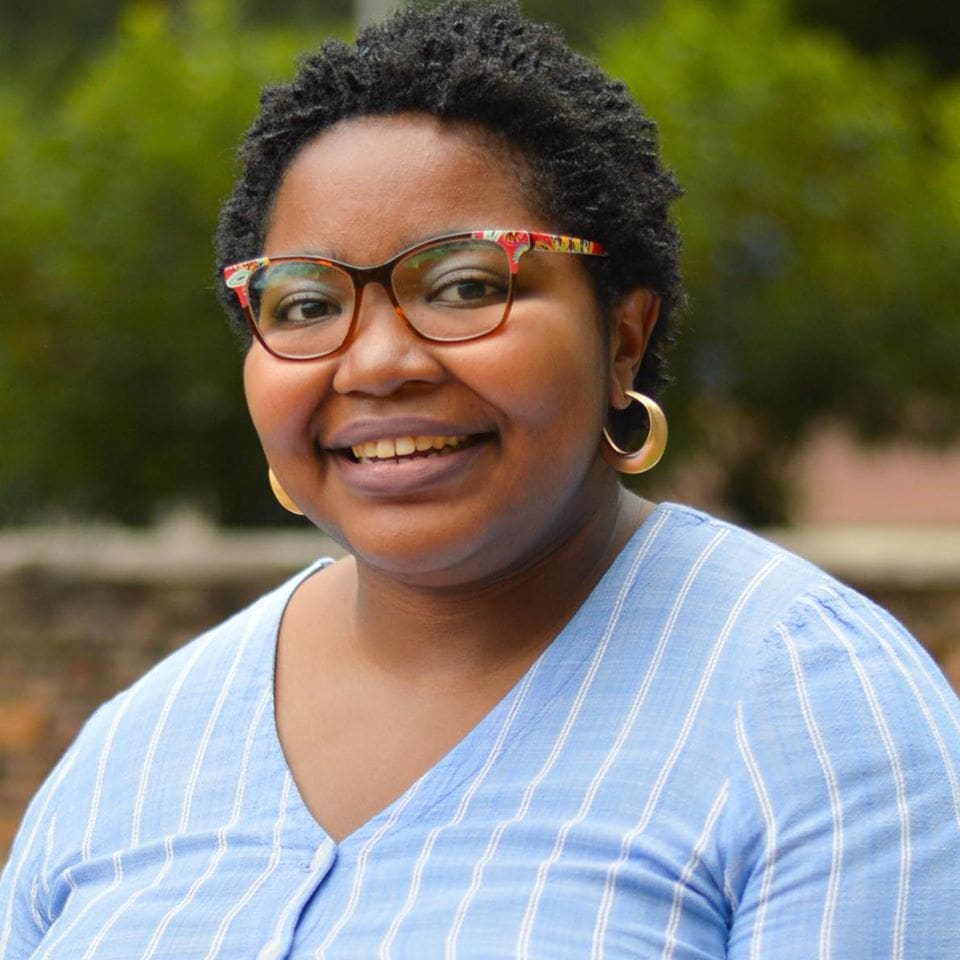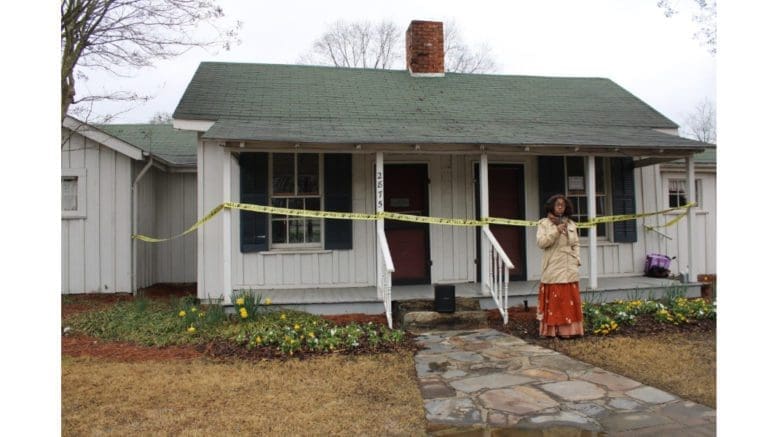By Arielle Robinson
The Coalition to Save Aunt Fanny’s Cabin, an interracial group of Smyrna residents whose goal is to keep the former restaurant downtown, held a press conference Wednesday afternoon at the cabin to announce the two proposals they have made to preserve the cabin and its history.
At 8:53 a.m. that day, the coalition submitted paperwork to the city’s Purchasing Department.
One of the proposals the group made is for them to rent or lease the land from the city to keep it in its current location.
“We will take on the full expense of doing the upgrades, the renovations, the maintenance, et cetera,” former Smyrna City Councilwoman and coalition member Maryline Blackburn said at the press conference. “That will definitely fall on the coalition as well as the partners that we are currently working with.”
The final stretch of the fate of Aunt Fanny’s Cabin is fast approaching.
The city will vote at its March 21, 7 p.m. regular meeting on what to do with the building.
At their Committee of the Whole work session tonight at 6:30 p.m., the city will discuss bids submitted to them.
Smyrna extended the deadline for someone to take the dilapidated building and move it from February 1 to March 16 at 10 a.m., after public outcry from opponents.
The extension also came after two previous bids that did not meet city criteria.
If no one makes an acceptable bid, the building is set to be demolished.
Although the city offers the former restaurant free of charge, whoever wants to move it has to pay for the move.
Blackburn said the coalition has approached the city on multiple occasions to ask if it would consider doing a private-public partnership with a company, but to the coalition’s chagrin, the city has not reached out about that sort of agreement.
In a copy of the coalition’s request for a proposal document to lease, it states that the coalition would lease the land from Smyrna “for a mutually agreed-upon monthly fee for a period of four years.”
If the city agrees to this proposal, the coalition plans to start renovations on September 21.
The document states, “We will work with the City of Smyrna to identify the original fixtures and furnishings that can be retrieved…that were part of the original structure as of December 20, 2021. These features will be retrieved immediately and will be placed in storage until final plans are agreed to.”
The second proposal from the coalition is to relocate the cabin to the Rose Garden Hills community, a historically Black neighborhood in the city.
Coalition members have not yet revealed where specifically in the community it would be.
If the city council votes to approve this option, the coalition plans to launch a fundraising campaign strategy and refine it in the days after the vote.
The plan would be to relocate the cabin on September 1, near the late summer 2022 city deadline.
Liability insurance would be provided through the coalition’s building mover.
“Currently, the proposal submitted by the Coalition’s Building Mover is approximately $47,000,” the relocation RFP reads.
The group plans to use its GoFundMe, which has raised $4,000 out of a $15,000 goal, as one way to pay for these proposals.
The group also states that further fundraising efforts are currently happening and grant applications that will provide extra funds for the cabin are being identified.
The relocation RFP states that the primary source of funding comes from coalition members.
It also states, “We have also received endorsements from a number of relevant groups and individuals who are financially committed to the preservation of the cabin.”
Blackburn said she could not share who the partners the group is working with are yet.
If any of their proposals go through, the group will share partners’ information along with where exactly in Rose Garden Hills the cabin would be at if the city accepts that specific proposal.
Blackburn also said that the coalition has been in touch with several people who used to work at the cabin.
In addition to the proposals, the coalition is working on the creation of a non-profit known as “The Fanny Williams Center for Reconciliation and Racial Harmony,” abbreviated as the FWC.
They say the goal is for the FWC to own the cabin along with its partners.
“Upon award announcement, the City of Smyrna shall relinquish ownership of the Cabin the FWC at no cost in exchange for the relocation of the structure and the necessary cleanup onsite,” the relocation RFP states.
A bid tab from the city’s Purchasing Department shows that four entities have submitted proposals for the cabin.
While two of those are from the coalition, one is from Ashley Limousin Farms Inc., a seedstock cattle company, and Whey to Go, LLC, coalition member Karen Shockley’s company.
Shockley made proposals similar to the coalition member’s proposals, she said.
Mayor Derek Norton at a city council meeting early last month stated that a committee comprised of faith leaders, civil rights groups, and longtime residents will be formed to decide on how best to memorialize Williams.
Since then, the committee has met and it is clear — as it has been for months now — that keeping the structure in its current location is not an objective for the city.
In a city document about RFPs, Smyrna requests that whoever assumes ownership of the building let the back fireplace and chimney stay for future memorial plans.
One of the reasons the coalition would prefer their initial proposal is because of the physical state of the building.
They argue that separating the fireplace from the building would add unnecessary costs to the move and cause unneeded stress to the already frail structure.
Moreover, as Blackburn has stated in previous events and meetings, the group believes that the story of Fanny Williams’ life, the namesake of the cabin, cannot be told without the cabin.
“I think it’s important that we understand that the only narrative that has been heard is the narrative that this administration has put out,” Blackburn said. “But there’s a much bigger narrative that we need to understand, and it has to do with Fanny Williams, it has to do with reconciliation, and it has to do with racial harmony.”
Coalition members believe that a reason the city is adamant about getting rid of the cabin through either demolition or relocation is that it does not want to deal with a shameful history of white supremacy in the city and wider metro area.
The building, which used to be a sharecropper’s home and turned into the world-famous restaurant that hosted celebrities and former President Jimmy Carter, featured Black boys serving all-white patrons in demeaning fashions.
Much has been written about the restaurant and the wealthy white Smyrna family who owned the historic building.
The history surrounding Williams’ life is murkier, though.
Local historians, city officials, and residents in Smyrna all offer impassioned, yet competing versions of the supposed civil rights activist’s life.
Williams was a servant for Isoline McKenna Campbell’s family, who were some of the city’s first settlers. Campbell opened the restaurant in the 1940s and was said to have used Williams’ recipes for her celebrated Southern meals.
While some people in favor of the cabin argue that the relationship between Campbell and Williams was an early form of racial reconciliation, not everyone sees the issue this way.
The city last December condemned the former restaurant for its racist themes.
City Councilman Dr. Lewis Wheaton said in a previous council meeting that the Black woman “apparently so beloved by the family that employed her and happily used her name to open up a restaurant focused on the revival of old Dixie” lies in a possibly unmarked grave overrun by weeds and grass in the metro Atlanta area.
FindaGrave.com mentions Williams may have chosen to be buried in a public plot so her money could be donated to community causes.
Still, the Coalition to Save Aunt Fanny’s Cabin believes Smyrna should embrace the cabin as history, especially in light of Black History Month last month and Women’s History Month currently.
They say its current location next to the city’s history museum cannot be coincidental.
“This is to save the history of Smyrna,” Blackburn said. “Regardless of how good, bad, ugly, pretty it is. It is Smyrna’s history and we have to fight to save it.”
Coalition member Pat Burns said she thinks the cabin can be used as an educational tool for the racial trust-building initiative the city started last year.
“I think Smyrna could save Aunt Fanny’s Cabin and accept its history, its entangled history, and reclaim the space,” Burns said. “This is racial trust-building — on this foundation.”
Every Sunday for the past few weeks at the cabin, the coalition has hosted a “circle of strength,” where community members honor Williams’ life.
The event features faith leaders and its goal is to get enough people to encircle the cabin as a demonstration of racial solidarity and show that people value the building and its history, coalition members have stated.
The event will occur weekly at 3 p.m. and go on until the end of the month.
The group also hosts weekly Zoom calls on Thursdays at 6:30 p.m. to talk about Williams’ life. Blackburn mentioned that people who want to attend these meetings, called “Rediscovering Aunt Fanny’s Cabin,” can email saveauntfannyscabin@gmail.com.

Arielle Robinson is a student at Kennesaw State University. She also freelances for the Atlanta-Journal Constitution and is the former president of KSU’s chapter of the Society of Professional Journalists as well as a former CNN intern. She enjoys music, reading, and live shows.

The Smyrna Historical Society noted this sharecropper’s cabin is only one if 8 left in Cobb County. Both White and Back families resided in cabins such as this one, while working land owned by others. This work arrangement on farms continues today throughout the nation. In some areas living arrangements have greatly improved but often Hispanic workers experience below standard housing.